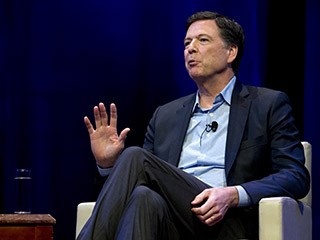Fired FBI Director James Comey defended himself in a New York Times op-ed Thursday, minutes after the release of DOJ Inspector General (IG) Michael Horowitz’s report that found “dramatic” protocol breaches in his handling of the Hillary Clinton email investigation.
“I do not agree with all of the inspector general’s conclusions, but I respect the work of his office and salute its professionalism,” Comey wrote.
Horowitz’s 568-page report on the “Midyear Exam” investigation contains several serious criticisms of Comey’s conduct, many of which echoed the conclusions of Deputy Rod Rosenstein’s May 2017 memo recommending the then-FBI director be fired.
For example, Horowitz’s report slams the process by which Comey came to give a July 2016 press conference in which he all but cleared Hillary Clinton of criminal wrongdoing. The report concludes:
Comey admitted that he concealed his intentions from the Department until the morning of his press conference on July 5, and instructed his staff to do the same to make it impracticable for Department leadership to prevent him from delivering his statement. We found that it was extraordinary and insubordinate for Comey to do so.
The IG’s report continues, “We concluded that Comey’s unilateral announcement was inconsistent with Department policy and violated long-standing Department practice and protocol by, among other things, criticizing Clinton’s uncharged conduct.”
Comey evidently disagrees. In his op-ed, he writes:
Before 2016, I could never have imagined doing such a thing, because the normal practice was always for the F.B.I. director to coordinate statements with the attorney general and for leaders of the Justice Department to report the details of the completed investigation.
But even in hindsight I think we chose the course most consistent with institutional values. An announcement at that point by the attorney general, especially one without the transparency our traditions permitted, would have done corrosive damage to public faith in the investigation and the institutions of justice. As painful as the whole experience has been, I still believe that. And nothing in the inspector general’s report makes me think we did the wrong thing.
Days before the November 2016 election, the investigation reopened as result of discoveries of new Clinton emails on former Rep. Anthony Weiner’s laptop made in course of a seemingly unrelated child pornography investigation. Regarding Comey’s decision to inform Congress of this change, the report says, “[W]e found it extraordinary that Comey assessed that it was best that the FBI Director not speak directly with the Attorney General and Deputy Attorney General[.]”
Comey defends himself against this accusation, saying, “to have concealed it would have meant to hide vital information: That what I and others had said publicly and under oath to Congress was no longer true. I chose to speak and tell the truth.”
Finally, the IG’s report takes Comey to task for his use of his personal email for conducting official FBI business, albeit only with unclassified material. “We found that, given the absence of exigent circumstances and the frequency with which the use of personal email occurred, Comey’s use of a personal email account for unclassified FBI business to be inconsistent with Department policy,” the report concludes.
In his op-ed, Comey defends the FBI’s overall conduct, claiming, “First, the inspector general’s team went through the F.B.I.’s work with a microscope and found no evidence that bias or improper motivation affected the investigation, which I know was done competently, honestly and independently.”
The report does not conclude there is proof that any major decision in the Clinton email probe was made due to political bias, but did find that some FBI personnel involved had a “biased state of mind.”
“The report also resoundingly demonstrates that there was no prosecutable case against Mrs. Clinton, as we had concluded,” Comey writes in perhaps the ultimate defense of his conduct. “Although that probably will not stop some from continuing to claim the opposite is true, this independent assessment will be useful to thoughtful people and an important contribution to the historical record.”
The IG’s report makes no independent determination of Clinton’s criminal liability, but it does contain ample evidence of broad consensus among Comey, his FBI subordinates, and DOJ officials that no viable case existed.
A glimpse of that understanding is seen in Comey’s own observation, made in an interview with the IG’s investigators, “that there was no fricking way that the Department of Justice in a million years was going to prosecute that.”

COMMENTS
Please let us know if you're having issues with commenting.